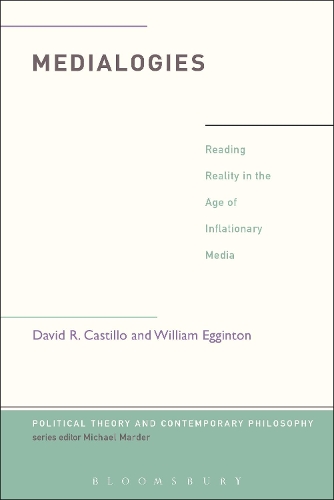
Medialogies: Reading Reality in the Age of Inflationary Media
(Hardback)
Available Formats
Publishing Details
Medialogies: Reading Reality in the Age of Inflationary Media
By (Author) David R. Castillo
By (author) William Egginton
Bloomsbury Publishing PLC
Bloomsbury Academic USA
17th November 2016
United States
Classifications
Professional and Scholarly
Non Fiction
Political science and theory
Social and political philosophy
302.23
Physical Properties
Hardback
288
Width 152mm, Height 229mm
558g
Description
We are living in a time of inflationary media. While technological change has periodically altered and advanced the ways humans process and transmit knowledge, for the last 100 years the media with which we produce, transmit, and record ideas have multiplied in kind, speed, and power. Saturation in media is provoking a crisis in how we perceive and understand reality. Media become inflationary when the scope of their representation of the world outgrows the confines of their culture's prior grasp of reality. We call the resulting concept of reality that emerges the culture's medialogy. Medialogies offers a highly innovative approach to the contemporary construction of reality in cultural, political, and economic domains. Castillo and Egginton, both luminary scholars, combine a very accessible style with profound theoretical analysis, relying not only on works of philosophy and political theory but also on novels, Hollywood films, and mass media phenomena. The book invites us to reconsider the way reality is constructed, and how truth, sovereignty, agency, and authority are understood from the everyday, philosophical, and political points of view. A powerful analysis of actuality, with its roots in early modernity, this work is crucial to understanding reality in the information age.
Reviews
Following the views of postmodern theorists that the media now represent a hyperreal world, one that is constructed/configured by media impressions of reality, the authors see the media as arbiters and editors of a world presented as a commodity to a public. They wed such perspectives to the growth of modernism, individualism, sciences power to render things objectively, and the agency of artists to render the world subjectively Extending into todays politics, politicians like Trump copy images of Americas past to apply to Americas future. Media participate in acts of transformative reality, a series of codes parsing the world for personal consumption, making the real world I-world. * CHOICE *
Every epoch demands, expresses, and is determined by a book. Most of the time these texts are noticed years after the fact, as it takes generations of scholars and readers to acknowledge the extent to which they capture that epoch. But Medialogies, like Deleuze and Guattari's A Thousand Plateaus or Hardt and Negri's Empire, will have an immediate impact. The argument that humanities are not a luxury is in itself not new; but this book shows that they have become vital to our very survival as a species precisely because of how media frame, politically and culturally, our conception of reality. If Castillo and Egginton manage to express these theses with examples from TV series like True Blood, political events like the Occupy movement, or such writers as Borges, it is not only because they are brilliant academics, but most of all because they are true intellectuals, something that has become rare in the 21st century. * Santiago Zabala, ICREA Research Professor of Philosophy at the Pompeu Fabra University, Spain *
This volume pushes the boundaries of scholarship across an impressive subject range. Castillo and Egginton have constructed an adventurous set of ideas that provide challenging new insights into the ways the various media plays a key role in the formation of our contemporary reality. * Anthony J. Cascardi, Professor and Dean of Arts and Humanities, University of California Berkeley, USA *
Author Bio
David R. Castillo is Professor and Chair of the Department of Romance Languages and Literatures at the State University of New York at Buffalo, USA. William Egginton is Andrew W. Mellon Professor in the Humanities and Chair of the Department of German and Romance Languages and Literatures at Johns Hopkins University, USA.
